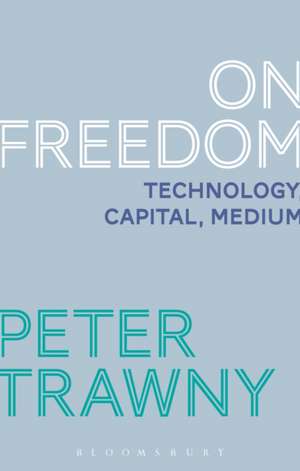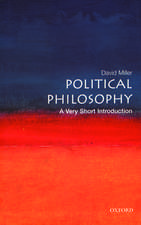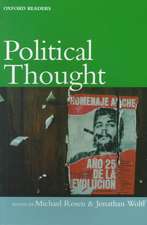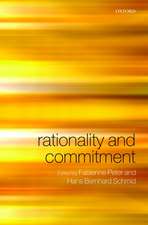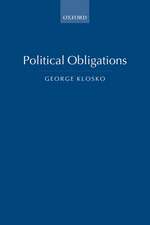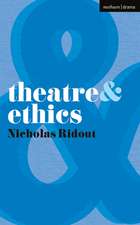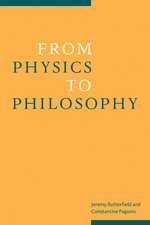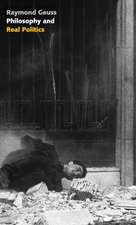On Freedom: Technology, Capital, Medium
Autor Professor Dr. Peter Trawny Traducere de Richard Lamberten Limba Engleză Paperback – 15 noi 2017
| Toate formatele și edițiile | Preț | Express |
|---|---|---|
| Paperback (1) | 157.32 lei 6-8 săpt. | |
| Bloomsbury Publishing – 15 noi 2017 | 157.32 lei 6-8 săpt. | |
| Hardback (1) | 465.19 lei 6-8 săpt. | |
| Bloomsbury Publishing – 15 noi 2017 | 465.19 lei 6-8 săpt. |
Preț: 157.32 lei
Preț vechi: 184.18 lei
-15% Nou
Puncte Express: 236
Preț estimativ în valută:
30.10€ • 31.51$ • 24.91£
30.10€ • 31.51$ • 24.91£
Carte tipărită la comandă
Livrare economică 08-22 aprilie
Preluare comenzi: 021 569.72.76
Specificații
ISBN-13: 9781474273039
ISBN-10: 1474273033
Pagini: 208
Dimensiuni: 138 x 216 x 20 mm
Greutate: 0.23 kg
Editura: Bloomsbury Publishing
Colecția Bloomsbury Academic
Locul publicării:London, United Kingdom
ISBN-10: 1474273033
Pagini: 208
Dimensiuni: 138 x 216 x 20 mm
Greutate: 0.23 kg
Editura: Bloomsbury Publishing
Colecția Bloomsbury Academic
Locul publicării:London, United Kingdom
Caracteristici
Peter Trawny is a very prominent German philosopher who is in charge of the Heidegger archive and has been featured in the US and European media prominently as a result of his work on Heidegger's 'Black Notebooks'
Notă biografică
Peter Trawny is Professor of Philosophy at Bergische University, Wuppertal, Germany. A specialist in phenomenological and hermeneutical political philosophy and aesthetics, he is the author of books on Heidegger, Hegel, Arendt, and Plato, and a co-editor of Heidegger's Gesamtausgabe, or the complete works (vol. 35, 69.73, 90).Richard Lambert is a translator based in Berlin. He gained his PhD in philosophy from the University of Warwick.
Cuprins
Preface1. The Double Topology1.1 The Poetic Topology1.2 The Mathematico-Technological Topology2. The Idea-Matter-Matrix3. What Is:3.1 Technology3.2 Capital3.3 Medium3.4 The TCM Universal3.4.1 The Scientific Universal3.4.2 The Human Universal3.4.3 The Natural Universal3.4.4 The First Universal Hierarchy3.4.5 The Second Universal Hierarchy: Quantity ? Quality3.4.51 Excursus: Quantity and Time4. The Universal and the Universal Topology5. The Universal Subject5.1 The Subject before the TCM Universal: Solipsism and Intimacy5.2 The Subject within the TCM Universal: Indifference and Normality6. Pragma-Politics7. The Final Revolution8. Anachronisms9. The Double Topology and the Museum10. Patho-topo-logy10.1 The Patho-topo-logy of the Subject in the TCM Universal I10.2 The Patho-topo-logy of the Subject in the TCM Universal II: Loss11. The Differentiated Subject/Violence12. Intimacy and Freedom13. Philosophy as ImpossibilityNote on the Wittgenstein CitationNotes
Recenzii
On Freedom gives us a stark and striking vision of the modern global order. By emphasizing the necessity and seamlessness of our technological, economic, and communicative systems, Peter Trawny paradoxically incites us to dream of something else: a realm of genuine freedom, "impossible" though it may be. Taking inspiration from figures such as Ernst Jünger and Martin Heidegger but contributing telling insights of his own, Trawny has produced a disturbing, provocative book.
Trawny is familiar to many in the English speaking world as the editor of Heidegger's infamous Black Notebooks. He has also published incisive and original works that deal frontally and without subterfuge or apologetics with Heidegger's - now established beyond any doubt - anti-Semitism. Yet, Trawny is more than an editor and exegete. He is also an original philosopher, writing in arresting German, beautifully captured in his excellent translation by Richard Lambert. Marcuse sought to synthesize Marx and Heidegger in the early thirties of the last century, before he had to escape from Nazi Germany. Habermas carried the challenge by turning away from Heidegger and taking up Searle, Wittgenstein, Mead, and Durkheim, while leaving behind Marx. This book aims to show how we can philosophize about our modern condition, while updating and renewing Marx, Marcuse, Habermas and Derrida, in one heady and poetic synthesis. For Marx, economics was part of philosophy, because it was about elucidating the impossible possibility of freedom. Trawny shows us how we can think freedom from out of our new conditions of necessity: the entanglement of Technology, Capital, and the ever emergent media of the technological medium.
Trawny is familiar to many in the English speaking world as the editor of Heidegger's infamous Black Notebooks. He has also published incisive and original works that deal frontally and without subterfuge or apologetics with Heidegger's - now established beyond any doubt - anti-Semitism. Yet, Trawny is more than an editor and exegete. He is also an original philosopher, writing in arresting German, beautifully captured in his excellent translation by Richard Lambert. Marcuse sought to synthesize Marx and Heidegger in the early thirties of the last century, before he had to escape from Nazi Germany. Habermas carried the challenge by turning away from Heidegger and taking up Searle, Wittgenstein, Mead, and Durkheim, while leaving behind Marx. This book aims to show how we can philosophize about our modern condition, while updating and renewing Marx, Marcuse, Habermas and Derrida, in one heady and poetic synthesis. For Marx, economics was part of philosophy, because it was about elucidating the impossible possibility of freedom. Trawny shows us how we can think freedom from out of our new conditions of necessity: the entanglement of Technology, Capital, and the ever emergent media of the technological medium.
